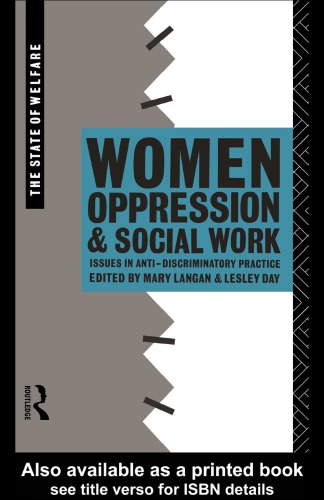Women Oppression and Social Work Issues in Anti Discriminatory Practice 1st Edition by Lesley Day, Mary Langan 9781134902828 1134902824
$50.00 Original price was: $50.00.$35.00Current price is: $35.00.
Women Oppression and Social Work Issues in Anti Discriminatory Practice 1st Edition by Lesley Day, Mary Langan – Ebook PDF Instant Download/Delivery: 9781134902828, 1134902824
Full download Women Oppression and Social Work Issues in Anti Discriminatory Practice 1st Edition after payment

Product details:
ISBN 10: 1134902824
ISBN 13: 9781134902828
Author: Lesley Day, Mary Langan
Many of the gains of the women’s movement over the past 20 years now seem threatened by the combined effects of prolonged economic insecurity, reductions in the scope of welfare provision and a general shift in the climate of public opinion to the right. Social workers are faced with the growing damands of a more inpoverished and more unstable society, with less resources to meet these demands. In response to these pressures, feminist social work has begun to move beyond some of the limitations of both the traditional and radical social work models of the past. The emerging anti-discriminatory model recognizes the diversity of oppresions according to race, gender and class as well as those of age, disability and sexual orientation. Women, Oppression and Social Work offers a new perspective on feminist social work which takes account of the complexity of the manifold oppressions that affect the lives of most women and most social work clients.
Women Oppression and Social Work Issues in Anti Discriminatory Practice 1st Table of contents:
1: Women and oppression: race, class and gender
Introduction
Women and class
Race and gender: the black feminist critique
Patriarchy—a white concept?
Race, class and gender
Women as clients: motherhood and family life
Women social workers
Notes
References
2: Women’s psychology and feminist social work practice
Introduction
The legacy of psychoanalysis
The feminist psychoanalytic perspective
The carers and the cared for
Women social workers and women clients
The roots of child abuse
Mothers: a case of unconscious child abuse?
Sandra: a ‘coping’ mother
Towards a feminist social work practice
Note
References
3: Social work and power relations: towards a framework for an integrated practice
Introduction
Issues in the integration of structural and individual perspectives
Power relations: a framework for analysis
A mode of intervention based on empowerment
Conclusion
Note
References
4: Who cares? Women in the mixed economy of care
Introduction
The regulation of the family
The restructuring of the personal social services
Child care
Community care
Conclusion
Acknowledgement
References
5: Feminism, managerialism and performance measurement
Introduction
The knowledge-base as a site for feminist struggle?
The new managerialism
Managerialism and the new knowledge
Performance indicators—a case in point?
Conclusion
References
6: Malestream training?: Women, feminism and social work education
Introduction
Women social work students: training for change or control?
‘The boys’ game’? Women as social work educators
Feminism and its challenges to the curriculum
Note
References
7: The child sexual abuse ‘industry’ and gender relations in social work
Introduction
‘What to do about child sexual abuse?’: comparing the 1880s and the 1990s
The emergent child sexual abuse ‘industry’: are men in charge?
Reclaiming feminist principles in social work practice
References
8: Women with learning difficulties are women too
Introduction
Converging stereotypes
Reproductive rights and sexuality
Caring and dependency
Experiences of racism
Strategies for change
Acknowledgement
Notes
References
9: Working with black single mothers: myths and reality
Introduction
Myths and reality
Marriage and motherhood
Social work and black single mothers
Working with black women: a voluntary project
Conclusion
Notes
References
10: Women in residential work: dilemmas and ambiguities
Introduction
Women’s historical position in residential care
Sexuality in residential care: women’s role
Black women and substitute care
Race, gender and sexual identities
Conclusion
References
11: Lesbians, the state and social work practice
Introduction
Social work theory and lesbianism
Local Authorities—the 1980s into the 1990s; a move from oppression to liberal acceptance?
‘Coming out’—implications for students, workers and clients
Practice implications
Concluding thoughts
Acknowledgements
References
12: Social work and older women: where have older women gone?
Introduction: the rise of critical gerontology
The failure of feminism
Social work literature: a sad case of neglect
Ideologies and social constructions
Older women as a social group: factors which unite older women
Factors which differentiate older women
Current policy and practice
Concluding remarks
References
People also search for Women Oppression and Social Work Issues in Anti Discriminatory Practice 1st:
examples of women’s oppression in history
examples of women’s oppression
theories on the origin of women’s oppression
muslim women oppression
songs about women oppression
Tags:
Women Oppression,Social Work,Lesley Day, Mary Langan



